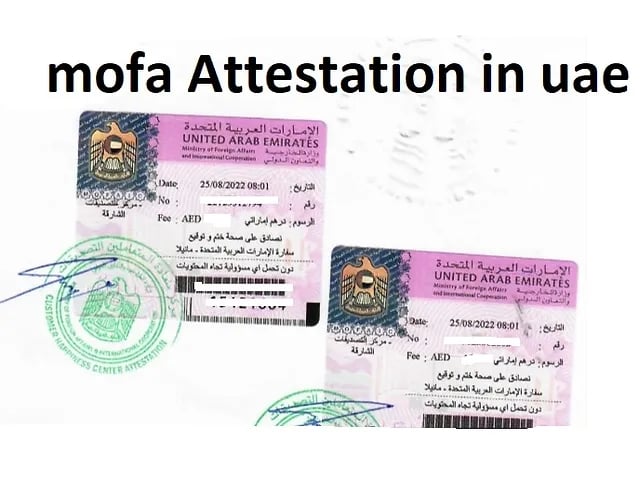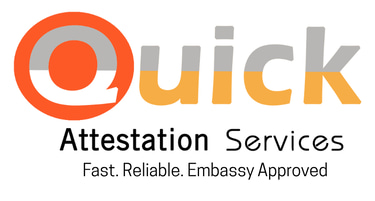Complete UAE Attestation Guide 2025
Discover the comprehensive guide to UAE attestation, including MOFA and embassy processes, as well as essential document verification steps for 2025. Ensure your documents are properly attested for a hassle-free experience.
9/16/20257 min read


Introduction to UAE Attestation
UAE attestation serves as a crucial process in the legalization and validation of documents originating from foreign countries that need to be recognized within the United Arab Emirates. This procedure ensures that various documents, such as educational certificates, marriage contracts, and employment papers, are authenticated by relevant authorities to confirm their legitimacy. The significance of UAE attestation is primarily rooted in its necessity for individuals and organizations seeking to engage in legal or professional activities in the country.
For expatriates and foreign professionals, attestation is often a mandatory requirement for employment purposes. Employers typically require attested educational qualifications and professional certifications to ensure that prospective employees possess the necessary credentials for the roles they are applying for. Similarly, individuals who intend to pursue higher education in UAE institutions must provide attested transcripts and degrees as part of their admission process, as these documents validate the candidate's academic history.
Moreover, the process of attestation extends beyond employment and education; it is equally essential in matters such as marriage and residency. Couples planning to marry in the UAE need to have their marriage certificates attested, particularly if they were issued abroad. This attestation legitimizes the marital status for legal and administrative purposes within the UAE framework. As globalization progresses, the importance of such processes grows, ensuring that documents from various jurisdictions are accepted and hold legal weight in the UAE.
In recent years, the UAE has taken steps to streamline the attestation process, making it more accessible for foreign nationals. Understanding the intricacies of this procedure is essential for individuals and businesses aiming to navigate the legal landscape successfully while ensuring compliance with local regulations.
Understanding MOFA and Its Role
The Ministry of Foreign Affairs (MOFA) plays a crucial role in the United Arab Emirates' framework for international relations and document authentication. It is responsible for ensuring that various documents such as educational certificates, marriage licenses, and corporate papers are verified and attested. The MOFA stamp is integral for documents required to be used inside the country, as it verifies their legitimacy and adherence to legal standards. The attestation process that MOFA employs includes a series of steps designed to authenticate documents thoroughly.
To begin with, MOFA's responsibilities extend beyond mere verification. It serves as a central authority for the attestation of documents that originate both within the UAE and from foreign entities. This includes but is not limited to educational diplomas, commercial documents, and personal status documents. Once a document is attested by MOFA, it carries a stamp that signifies its acceptance in legal and administrative matters throughout the UAE, offering confidence to both organizations and individuals regarding the document's authenticity.
The attestation process typically requires several preceding steps, including notarization and approval from the relevant ministry or department that issued the document. Once these initial verifications have been obtained, the document can be submitted to MOFA for the final authentication. The importance of having an authenticated document cannot be overstated, as many institutions, such as schools, banks, and governmental offices, mandate MOFA attestation for local acceptance. Without this crucial step, documents may be deemed invalid or inadmissible, leading to complications in legal or official matters.
In summary, the Ministry of Foreign Affairs serves as an essential body for document authentication in the UAE. Its rigorous process of attestation, culminating in an official stamp, ensures that documents are valid and legally recognized within the country. Understanding MOFA's role can help streamline the document verification process, making it easier for individuals and organizations to navigate legalities in the UAE.
The Embassy Attestation Process
The embassy attestation process is an essential step in the verification of documents to be used in the United Arab Emirates (UAE). Embassies are responsible for authenticating various types of documents, including educational certificates, personal documents, and commercial papers. This validation ensures that the documents are genuine and can be legally recognized in the UAE. The process typically involves several key steps aimed at ensuring proper verification.
To begin with, individuals seeking embassy attestation need to gather the required documents. Commonly required documents include the original certificate, a copy of the applicant's passport, and any prior attestation from local authorities or the Ministry of Foreign Affairs in the home country. Some embassies may have specific additional requirements, so it is advisable to check the embassy's website or contact them directly for updated information.
Once the required documents are prepared, they must be submitted to the relevant embassy for processing. This can often be done in person or through an authorized agent. The processing time for embassy attestation can vary, typically ranging from a few days to weeks, depending on the embassy's workload and the type of documents submitted.
Cost is another crucial aspect of the embassy attestation process. Fees can differ based on the embassy, the type of document, and the urgency required for processing. It is advisable to inquire about the cost structure prior to submission to avoid any unforeseen expenses.
Ultimately, embassy attestation serves a vital role in the recognition of foreign documents within the UAE, making it imperative for expatriates and businesses alike to understand and comply with the necessary procedures.
Required Documents for Attestation
The attestation process in the UAE, overseen by government bodies like the Ministry of Foreign Affairs (MOFA) and various embassies, necessitates specific documentation to ensure the legitimacy and authenticity of the records submitted. Understanding the required documents is crucial for a smooth attestation process.
For educational certificates, the primary documents include the original degree or diploma along with a set of certified copies. Depending on the institution, you may also need proof of enrollment or transcripts. These documents often require notarization to affirm their validity before submission for attestation.
Commercial documents, such as trade licenses, incorporation certificates, and commercial contracts, also need careful attention. The original documents, as well as copies, must be presented, and in some cases, an official notarization is essential to authenticate the documents prior to the attestation process.
Personal documents play a significant role in the attestation procedure. Birth certificates and marriage certificates typically require not just the originals but also attested copies. Many embassies insist on documents being notarized first, followed by attestation from the relevant authorities. Specifically, the birth certificate may also need to be translated into Arabic if it is in another language prior to the attestation.
It is important to keep in mind that while the specific requirements may vary slightly by embassy or MOFA, the general necessity for both original and certified copies holds true across the board. Additionally, ensuring that all documents are properly notarized can significantly streamline the attestation process, making it crucial to check the policy of the respective institution regarding notarization before proceeding. Consistently ensuring you have accurate and complete documentation is essential for successful attestation.
Step-by-Step Guide to Document Verification
Document verification is a crucial step in ensuring that your paperwork is ready for attestation in the UAE. The process may seem daunting, but by following a systematic approach, individuals and businesses can facilitate a smooth verification procedure. The first step is to organize your documents meticulously. Create a checklist of all required items, including academic certificates, marriage licenses, or commercial documents. By preparing these in advance, you can avoid last-minute scrambles that could lead to mistakes.
Next, it is essential to understand the hierarchy of document verification. Generally, documents must undergo verification in a specific order, starting from the issuing authority, followed by the Ministry of Foreign Affairs (MOFA), and finally the relevant embassy or consulate. Each level adds a layer of authenticity, so it is imperative to follow this sequence closely. Missteps in this hierarchy could delay the attestation process and lead to unnecessary complications. Ensure that all signatures and stamps from the issuing authorities are visible and clear, as they are a critical part of the validation process.
Additionally, employing best practices can significantly reduce the chances of errors. It is vital to double-check the accuracy of all personal information on the documents, including names and dates, as discrepancies can result in rejection. Keep duplicates of each document, as this can offer a backup should any items get misplaced during the verification stages. Furthermore, it may be beneficial to consult with professional attestation services if navigating the process proves challenging. Overall, a well-organized approach combined with an understanding of verification protocols will streamline your document attestation journey in the UAE.
Common Challenges and Solutions
The process of document attestation in the UAE can often present various challenges that individuals and businesses may face. One common issue is document discrepancies, which can arise due to differences in names, dates, or other pertinent details between the original document and the required supporting paperwork. These inconsistencies can lead to delays in processing times and may even result in the rejection of the attestation application. To minimize such issues, it is essential for applicants to conduct a thorough review of all documents beforehand, ensuring that all information is correctly aligned and matches across different documents.
Another prevalent challenge that applicants may encounter is the potential for processing delays. Factors contributing to these delays can include high application volumes and bureaucratic inefficiencies. These delays can be quite detrimental, especially when attestation is needed urgently for employment or relocation purposes. To address this challenge, it is advisable to submit applications well in advance of any deadlines, and to opt for expedited service if available. Staying informed about processing times and being proactive can significantly alleviate some of the stress associated with these delays.
Furthermore, applicants might face issues with unrecognized document formats. Certain documents may not meet the required specifications or may not be accepted in their current format, leading to complications in the attestation process. It is crucial for individuals to confirm the specific requirements for their documents ahead of time, including notary or certification needs, according to the regulations of the relevant authorities. Consulting with a qualified service provider can streamline this process and help in preparing the documents in an acceptable format.
By understanding these common challenges and implementing the suggested solutions, individuals can navigate the attestation process more effectively, ensuring a smoother experience overall.
Conclusion and Future Outlook
The attestation process in the United Arab Emirates (UAE) plays a crucial role in ensuring that documents are recognized and accepted within the country and internationally. This verification process is particularly significant for expatriates and businesses aiming to establish legitimacy, whether for employment, education, or legal purposes. With various institutions, including the Ministry of Foreign Affairs and International Cooperation (MOFA) and embassies, overseeing this procedure, individuals must navigate a structured framework to achieve document validation. The importance of documentation compliance cannot be overstated, as it directly affects a person’s or entity's capacity to operate effectively in both local and international contexts.
Looking towards the future, the attestation process is likely to undergo transformative changes driven by technological advancements. The increasing integration of digital platforms for document submission and tracking may streamline the process, allowing for faster verification methods. With the heightened demand for efficient services, individuals and businesses can anticipate improvements such as online application systems, automated verification tools, and enhanced communication between authorities. These innovations could substantially reduce the processing times associated with attestation.
Moreover, the evolving landscape of global mobility suggests that the UAE may refine its guidelines governing document verification to align with international standards. This could facilitate a more seamless experience for expatriates and foreign businesses seeking to operate within the UAE. As the attestation process continues to adapt, staying abreast of these changes will be essential for all stakeholders involved. Continuous dialogue among officials, businesses, and individuals will help ensure that the attestation procedure meets the growing expectations and needs of a dynamic, interconnected world.
